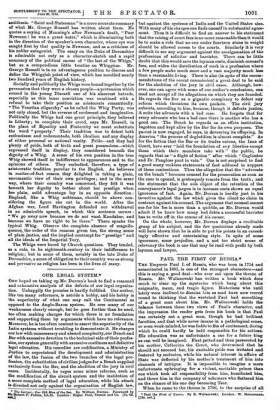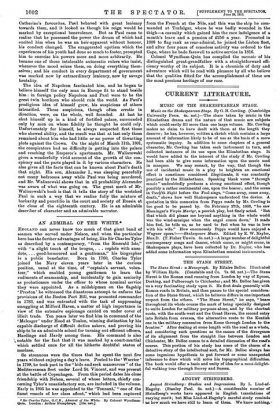PAUL THE FIRST OF RUSSIA.*
THE Emperor Paul I. of Russia, *ho was born in 1754 and assassinated in 1801, is one of the strangest characters—and this is saying a good deal—who ever sat upon the throne of Russia. Mr. Waliszewski has written a book which does much to clear up the mysteries which hang about this enigmatic, mean, and tragic figure. Historians who until lately were inclined to dismiss him as mad have now veered round to thinking that the wretched Paul had something of a great man about him. Mr. Waliszewski holds the balance between these two views of Paul's character, and the impression the reader gets from his book is that Paul was certainly not a great man, though he had brilliant faculties, and that while never insane in a pathological sense, or even weak-minded, he was liable to fits of excitement, during which he could hardly be held responsible for his actions. His education was as unfortunate a one for a future king as can well be imagined.. First petted and then persecuted by his mother, Catherine the Great, who determined that he should not succeed her, his excitable pride was irritated and fostered by seclusion, while his natural interest in affairs of State was deflected by his mother's treatment of him into channels of intrigue. It is impossible to imagine a more unfortunate upbringing for a violent, excitable prince than one which took all responsibility from him, humiliated him, and threw him in the company of schemers who flattered him on the chance of his one day becoming Tsar.
When he came to the throne in 1796, to the surprise of all • Paul the First of Russia. By B. Wallazewaki. London: W. Heinemann. [158. net.]
Catherine's favourites, Paul behaved with great leniency towards them, and it looked as though his reign would be marked by exceptional benevolence. But as Paul came to realize that he possessed the power the dream of which had excited him when he was an heir-apparent without honour, his conduct changed. The exaggerated egotism which the experiences of his youth had done so much to foster, prompted him to exercise his powers more and more arbitrarily. He became one of those intolerable autocratic rulers who insist, whenever the mood seizes them, on doing everything them- selves ; and his conduct in every department of government was marked now by extraordinary leniency, now by savage brutality.
The idea of Napoleon fascinated him, and he began to believe himself the only man in Europe fit to stand beside him : in foreign policy Napoleon and Paul were to be the great twin brethren who should rule the world. As Paul's prodigious idea of himself grew, his suspicions of others intensified. These suspicions, though often erratic in direction, were, on the whole, well founded. At last he shut himself up in a kind of fortified palace, surrounded only by men on whose fidelity he thought he could rely. Unfortunately for himself, he always suspected first those who showed ability, and the result was that at last only those remained about him who had little or no power of thwarting plots against the Crown. On the night of March 11th, 1801, the conspirators had no difficulty in getting into the palace and reaching the Emperor's apartments. Mr. Waliszewski gives a wonderfully vivid account of the growth of the con- spiracy and the parts played in it by various characters. He also gives all the facts that can be known about Paul's death that night. His son, Alexander I., was sleeping peacefully not many bedrooms away while Paul was being murdered; and Mr. Waliszewski shows that in all probability Alexander was aware of what was going on. The great merit of Mr. Waliszewski's book is that it tells the story of the wretched Paul in such a way that we realize fully the mixture of barbarity and punctilio in the court and society of Russia at the close of the eighteenth century. He is an admirable describer of character and an admirable narrator.



























































 Previous page
Previous page